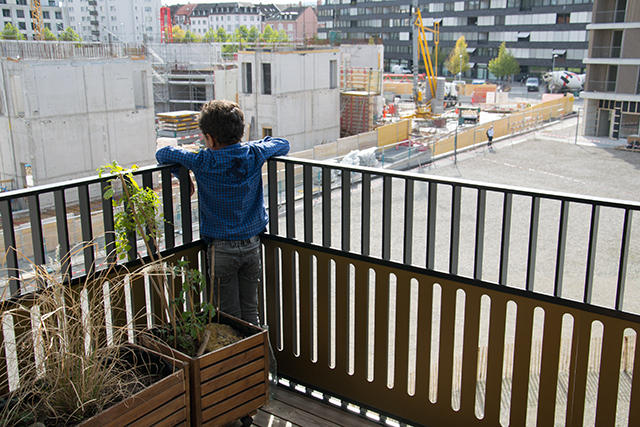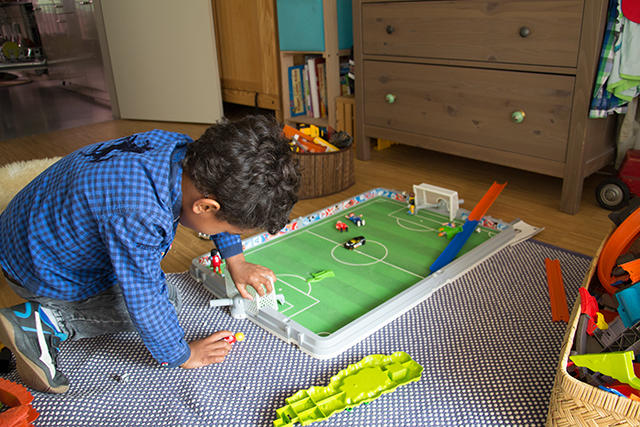
What it’s like to be a poor child in wealthy Switzerland

Niels doesn’t go hungry. He has his own room, wears clean clothes and attends football training. But his mother’s income is not enough to support them both and they rely on welfare. Financial precariousness in Switzerland is usually not apparent at first glance, but it leaves its mark on those affected.
Niels, 5, and his mother, 38, recently treated themselves to a “day of luxury”. Thanks to discounted tickets, they went to the circus. And it got even better. “We drank a coffee in a café and had a small sandwich,” she says in a quiet voice and smiles.
Universal Children’s Day
The United Nations Convention on the Rights of the ChildExternal link was passed by the UN general assembly on November 20, 1989. Switzerland signed up in 1997. Today, 193 states are signatories.
The convention commits Switzerland to providing all necessary assistance for children affected by poverty as far as is possible.
(Source: humanrights.ch)
Her son is beaming broadly. He is twirling through the kitchen, bursting with energy, and wants to talk and give a tour of the Basel apartment where the two of them have been living since the summer. Niels clearly feels at home here. His room has three doors, he says proudly. One leads to the kitchen, one to the sitting room and one onto the balcony.
‘Like winning the lottery’
The bright new apartment is on the second floor and is part of a building project that has not yet been completed. The balcony offers a view of a huge building site.
“A lively new quarter that you can help shape,” is how Habitat advertises the project. The foundation aims to create affordable homes. High earners pay more than tenants on low incomes.
When we first made contact on the telephone, Niels’s mother almost apologised a little for the “nice, new apartment”. She does not fit the stereotype of a single mother dependant on welfare. Fear of being labelled a social parasite looms large for many people living in poverty or threatened by it.
“It was like winning the lottery,” she says, sitting at her kitchen table. For months she had picked up her son from the crèche after work, then gone to stand in a queue with other home-seekers to look at an apartment for rent. The apartments within her budget range were either directly on a motorway or had no toilet of their own. She preferred to stay in her old apartment and keep looking. Until she heard from Habitat.

More
How far does CHF6,000 really get you in Switzerland?
Exhaustion
She says she no longer feels poor and things are looking up. As a teacher of dance and movement, she earns CHF800-CHF1,200 ($804-$1,206) a month, which doesn’t go far.
Single parents are more than twice as likely to be affected by poverty in Switzerland than the rest of the population, according to a studyExternal link by the University of Bern commissioned by Caritas Switzerland. Almost 20% of social welfare cases are single parents. In 2015, every sixth family in Switzerland was headed by a single parent and the proportion is increasing.
Niels’s parents separated when his mother was six months pregnant. After four years in France, she returned to Switzerland. She was on her own and dependent on welfare handouts. Six months after giving birth, she began to work again. She could only find employment paid by the hour and an attempt at self-employment didn’t work out.
According to the Caritas study, single parents with children under the age of six do about 17 hours of paid work and 54 hours of housework and childcare per week on average. The proportion of single parents classified as working poor is about four times higher than for the rest of the population.
“I was shocked and furious about this extremely stressful and hopeless situation. Sometimes I hardly had enough money to buy nappies for Niels.”
Niels’s mother chooses her words carefully. Her expression is tired. Niels is listening and suddenly becomes quieter. It is as though he senses that it is not easy for his mother to recall this time of absolute exhaustion.
Cantonal issue
Now that Niels is a little older, things have become easier. But even now, there is no question of popping to the supermarket next door to buy something she had forgotten. “You always have to think ahead and plan everything. That’s tiring.”
They cross the border to Germany to go shopping. The pair scoured the thrift shops of Basel in search of a bike helmet for Niels. It all takes time and energy.

Niels cycles up and down the gangway in front of the apartment door. He also has a skateboard and a go-cart. “All second-hand and presents,” the mother says. That doesn’t seem to bother Niels, who is beaming again and tells us he is doing football training.
His mother receives money for that from social services. If Niels were living in another canton, he might not be able to train so that he can become – as he puts it – “as good as Ronaldo”. Social welfare is determined by canton in Switzerland and therefore depends on where you live.
‘You don’t have a grip on your life’
But other children threatened by poverty are deprived of taking part in social activities. Parents who receive no social welfare because they earn just enough can give their children much less. For them it is difficult to “be part of it”. Niels, too, has already had experience of that.
At a children’s birthday party, he waited with the other little guests to give a present to the birthday child. Among all the big, beautifully wrapped boxes of Lego, Niels’s little dog made of balloons stood out.
But Niels’s mother has just one wish: to get off social welfare. She has the feeling that she is living in a permanent state of emergency. “I can’t be content to say to myself that I’m on social welfare and that’s where I’ll stay,” she says.
The worst is the daily stigmatisation. Again and again she hears people saying that she doesn’t have a grip on her life.
She says: “You do your best, but you’re constantly being put down.” That’s demoralising. “I had a lot more self-esteem six years ago than I do today.”
Niels is quiet again and sits on his mother’s lap. “How long is it until my birthday again, mummy?” he asks for the second time today. Niels would like to go to McDonald’s with his mother for his birthday. And he hopes his father in France will give him a hoverboard.
“My father is rich,” he beams and starts jumping around the kitchen again. “He has a TV and a car.”

Child poverty in Switzerland
307,000 children were affected by poverty or threatened with poverty in Switzerland in 2014. To calculate this, the Federal Statistical Office based its figures on the Guidelines of the Swiss Conference on Social WelfareExternal link.
In an international comparison, Switzerland invests little in families and children. EU countries spent 2.1% of GDP on average on families and children in 2013. Switzerland spends 1.5% of GDP.
(Source: Federal Statistics Office, Families in Switzerland, Statistical Report.)
Translated from German by Catherine Hickley

In compliance with the JTI standards
More: SWI swissinfo.ch certified by the Journalism Trust Initiative
















![The four-metre-long painting "Sonntag der Bergbauern" [Sunday of the Mountain Farmers, 1923-24/26] had to be removed by a crane from the German Chancellery in Berlin for the exhibition in Bern.](https://www.swissinfo.ch/content/wp-content/uploads/sites/13/2025/12/01_Pressebild_KirchnerxKirchner.jpg?ver=14ffbad8)














You can find an overview of ongoing debates with our journalists here . Please join us!
If you want to start a conversation about a topic raised in this article or want to report factual errors, email us at english@swissinfo.ch.